A recent interview I gave while in Stockholm to the Privacy as Innovation project:

A recent interview I gave while in Stockholm to the Privacy as Innovation project:

Here is my keynote speech at the recent Internetdagarna (Internet Days) conference in Stockholm, Sweden, discussing all things whistleblower, spy, surveillance, privacy and TTIP:
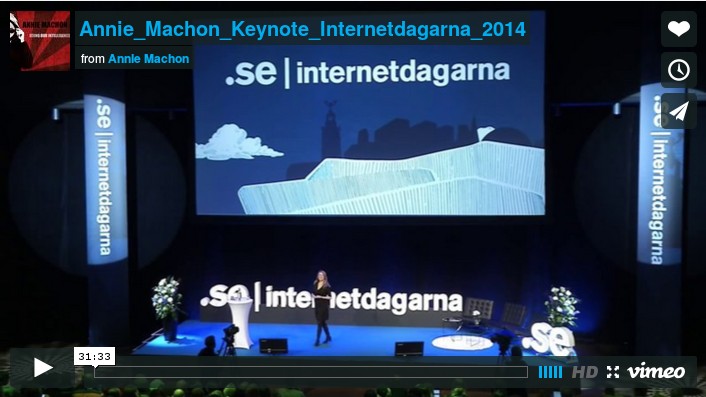
My recent interview on RT about the ending of the investigation by the German authorities into the apparently illegal bugging of Chancellor Angela Merkel’s phone, plus more on the wider complicity of the German intelligence services:
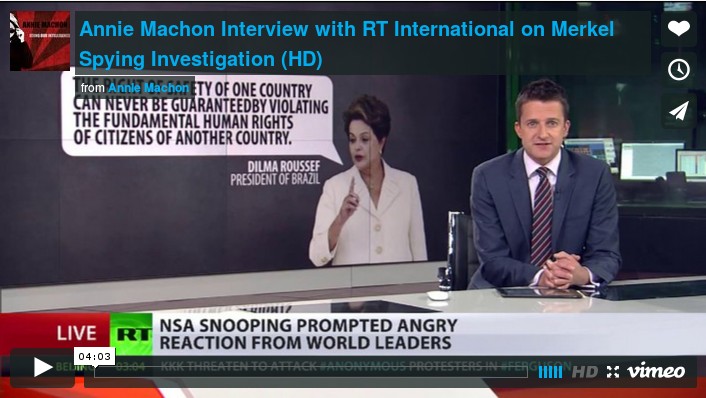
The last Soviet leader, Mikhail Gorbachev, said at the celebration of the fall of the Berlin Wall last weekend that we are facing a new Cold War. What are the geopolitical realities behind this statement?
First published on RT Op-Edge.
Last weekend I was invited onto RT to do an interview about the commemoration of the 25th anniversary of the fall of the Berlin Wall, particularly focusing on the speech delivered by the last Soviet leader, Mikhail Gorbachev, during his visit to Berlin.
I would like to expand on some of the topics I mentioned — how to encapsulate an alternative geopolitical perspective different from the Western orthodoxy in under four minutes? A task even Monty Python would find challenging!
The first issue was Gorbachev’s comments about a new Cold War. I would agree, and this is being fabricated by the USA, as that country always needs an Emmanuel Goldstein figure to justify its military-industrial complex that is bankrupting the country and brutalising the world, while enriching the US oligarchs to the detriment of civil society everywhere.
The first front line in this new Cold War is the internet. In the 1990s the USA had a golden opportunity — in fact a perfect storm of opportunities. It was the last superpower left standing in a newly unipolar world, history had officially ended and capitalism had triumphed. The Soviet Union had disintegrated and the newly shorn Russia was tottering, its vast national wealth being assiduously asset-stripped by the globalised neocon élite.
Plus, the new world wide web was exponentially growing and the key pioneers were predominantly American companies. After an initially panicked phase of playing catch-up in the 1990s, western spy agencies saw the potential for total mastery of the internet, creating a surveillance panopticon that the KGB or the Stasi could only have fantasised about. With thanks to Edward Snowden, we are now beginning to get glimpses of the full horror of the surveillance under which we all now live.
But it is not all down to the NSA. Building on the old Echelon model, which was so nearly overthrown in Europe back in July 2001, the NSA has suborned, bought and prostituted other western intelligence agencies across Europe to do its bidding. Germany, at the nexus of east and west Europe, remains a front line in this battle, with the BND possibly working unconstitutionally to do the NSA’s bidding, even apparently to the detriment of its own national interest. The politicians (some) and hacktivists (many) are fighting back.
But it is the geographical boundaries that have shifted most significantly since the fall of the Wall. Here I need to credit former senior CIA officer, presidential advisor and current peace activist Ray McGovern, for all the useful information he provided during his various talks and interviews across Europe a couple of months ago.
Ray, a fluent Russian speaker, worked as a Soviet expert for much of his career in the CIA. As such he was privy to the behind-the-scenes negotiating that occurred after the fall of the Wall. When this happened the USA pushed for German reunification but was worried about the 260,000 Soviet troops stationed in the former GDR. They cut a deal with Gorbachev, stating that NATO would not move “one inch” further than Germany after reunification. This the Soviets accepted, and withdrew their troops.
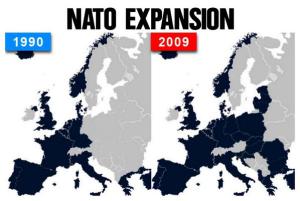 Well, we all know what has happened since. NATO has expanded east at an amazing rate, now encompassing a further 12 eastern European countries including the Baltic States and Poland, which the US has used as a base for an increasing number of “defensive” missile systems. In 2008 NATO also issued a declaration that Georgia and Ukraine would be welcome to join, taking the front line up to the borders of Russia. Coincidentally, both these countries in recent years have been portrayed as the victims of “Russian expansionism”
Well, we all know what has happened since. NATO has expanded east at an amazing rate, now encompassing a further 12 eastern European countries including the Baltic States and Poland, which the US has used as a base for an increasing number of “defensive” missile systems. In 2008 NATO also issued a declaration that Georgia and Ukraine would be welcome to join, taking the front line up to the borders of Russia. Coincidentally, both these countries in recent years have been portrayed as the victims of “Russian expansionism”
In 2008 Georgia invaded the disputed ethnic Russian region of South Ossetia. Russia moved to protect the people and gave the Georgian military a bloody nose. Anyone remember that? At the time it was portrayed across the Western media as Russian aggression, but the facts have emerged since to disprove this version of events.
Similarly, this year we have seen a violent coup overthrow democratically-elected President Yanukovych of Ukraine when he was inclined to stay within the Russian sphere of influence rather than ally the country more closely to the EU under the asset-stripping austerity measures demanded by the International Monetary Fund. Victoria Nuland, the US Assistant Secretary of State responsible for Europe, was heard to discuss the US had over previous years pumped $5 billion into Ukraine to subvert it, that the newly installed Prime Minister would be “their man”, and “fuck the EU”.
And yet still Russia is blamed for aggression. I am not an apologist for Russia, but the facts speak for themselves even if they are not widely reported in the Western mainstream media.
But why on earth would the US be meddling in Ukraine? Would an expansion of NATO be sufficient excuse in America’s self-interested eyes? Probably not.
Which leads me on to a very interesting article by Eric Zuesse. The argument of his well-researched and referenced report is that it all comes down to energy supplies once again. When does it not?
The USA has some unsavoury allies in the Middle East, including theocratic dictatorships such as Saudi Arabia and Qatar. Their vast energy reserves are not only essential to the USA, but also the trading of these reserves in the petrodollar monopoly is vital to propping up the bankrupt US economy.
Russia, at the moment, is the primary energy supplier to the EU — the world’s largest market. Iran, a Russian client, wanted to build a pipeline via Syria with President Assad’s approval, to exploit this vast market. However, Saudi Arabia, Qatar and the USA apparently have other plans involving a pipeline from Qatar via Syria to Europe.
Hence the urgent need to overthrow Assad and put a Sunni puppet government in place, more palatable to those pulling the strings. Qatar’s preferred candidate of choice would be more moderate, such as the Muslim Brotherhood. Saudi, on the other hand, would have no compunction about installing a hard-line fundamentalist régime in place — up to and including ISIS. And thus the murder, mayhem and human suffering erupting across the region now. This is an appalling real life example of the horrors inherent in Brzezinski’s psychopathic “grand chessboard”.
It is widely accepted truism today, over a decade after the “war on terror” began, that all the wars in the Middle East were launched to protect America’s oil and energy interests. Less well known is the country’s desperate scramble to protect the petrodollar monopoly. If that fails, the dollar will no longer remain the world’s reserve currency and the USA is financially screwed.
If you look at all the recent wars, invasions, and “humanitarian interventions” that have resulted in collapsed countries and anarchy across whole regions, it is clear that beyond oil and gas the key issue is money: pre-2003 Iraq tried to trade what oil it could in euros not dollars and Saddam Hussein was deposed; despite being welcomed briefly back into the international fold, once Libya’s Colonel Gaddafi began to talk about establishing an African gold dinar currency, backed by Libya’s oil wealth to challenge the petrodollar, he too was toppled; Assad wanted to facilitate energy pipelines to Europe for Russia and Iran, and he was attacked; even Iran tried to trade its energy reserves in euros, and lo and behold it was almost invaded in 2008; and finally Russia itself trades some of its energy in rubles.
As people say, always follow the money.
So, in my view, this is the current geopolitical situation. Russia is now strong enough, with its domination of Europe’s energy supply, its backing of Middle Eastern countries that want to break away from the US sphere of influence, and its trade deals and establishment of an independent global investment development bank with other BRICS countries, that it can challenge the US hegemony.
However, threaten the petrodollar monopoly and thereby the very financial solvency of the United States of America and you are suddenly Public Enemy No 1.
As I said, I am by no means an apologist for Russia — I tell it like I see it. To western sensibilities, Russia has some serious domestic issues to address: human rights abuses during the brutal Chechen war; its suspected involvement in the death by polonium-210 poisoning of KGB defector Alexander Litvinenko in London in 2006; its overly-punitive drug laws; and human rights abuses against dissidents, the LGBT community, and journalists. Yet the West has merely mouthed platitudinous objections to all these issues.
So why now is Russia being internationally excoriated and penalised for actions for which it is not responsible? Over the last few years it has looked statesmanlike compared to the US and its vassal states: it was not involved with the Libya fiasco, it has given safe haven to NSA whistleblower Edward Snowden, and it halted the rush to yet another disastrous western war in Syria.
Nor, to my western European sensibilities, are America and its acolytes too pristine either, with their mass surveillance, presidentially-approved kill lists, illegal wars, kidnapping, torture and drone bombings. Not to mention their domestic addiction to gun ownership and the death penalty, but that’s another story.…
Yet the US media-enabled propaganda machines justify all of the above and demonise another country, creating yet another fresh bogeyman to justify yet more “defence” spending.
The Russian bear is being baited, increasingly surrounded by yapping curs. I thought this sport had been made illegal hundreds of years ago, at least in Europe — but obviously not in the dirty realm of international politics. It is a marvel the bear has not lashed out more in the face of such provocation.
There was a chance for peace when the Wall came down 25 years ago. If the US had upheld its side of the gentlemen’s agreement about not expanding NATO, if the neocon predators had not pounced on Russia, and if closer integration could have been achieved with Europe, the future could have been rosy.
Unfortunately, I have to agree with Gorbachev — we are indeed facing a new Cold War, and this time it is of America’s making. But Europe will bear the brunt, through trade sanctions, energy shortages and even, potentially, war. It is time we Europeans broke away from our American vassalage and looked to our own future.
Here is my recent interview on RT discussing the UK listening post, GCHQ, its prostitution to America’s NSA, and the failure of oversight:
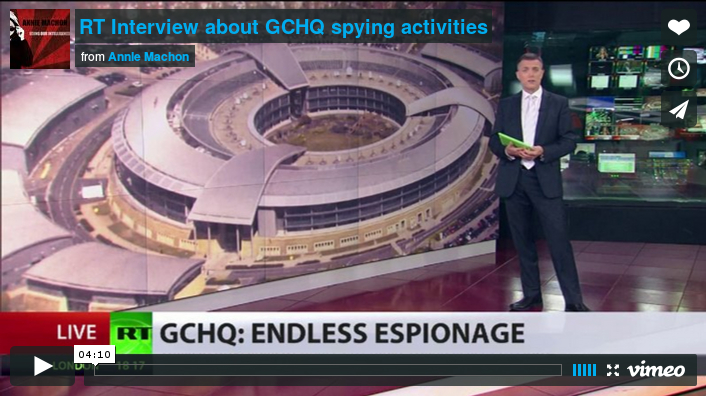
Information has emerged recently that the German spy agency, the BND, has been caught out bugging Hillary Clinton, John Kerry, and now the Turkish government.
Today I did an interview on RT on the subject. Intriguingly, it appears this information was part of the cache of documents an alleged mole in the BND sold to his US spymasters.
So what is really going on here?
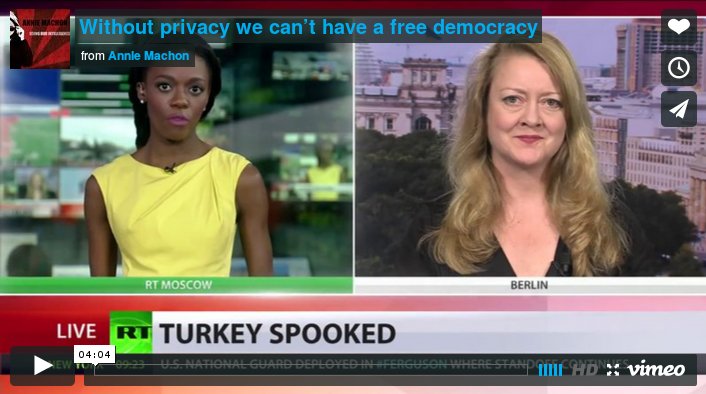
Here’s my interview from yesterday on RT’s excellent Breaking the Set show with host, Abby Martin. We discussed all things spy, surveillance, Snowden, oversight, and privacy. A fun and lively interview! Thanks, Abby.
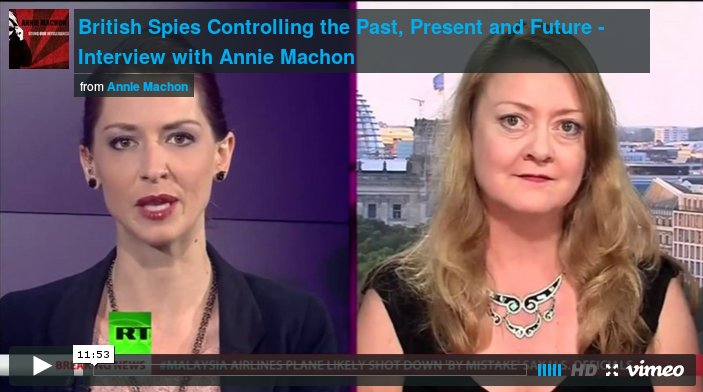
A comment piece from last week on RT about German politicians wanting to go back to paper-based communications to evade the US spy panopticon:
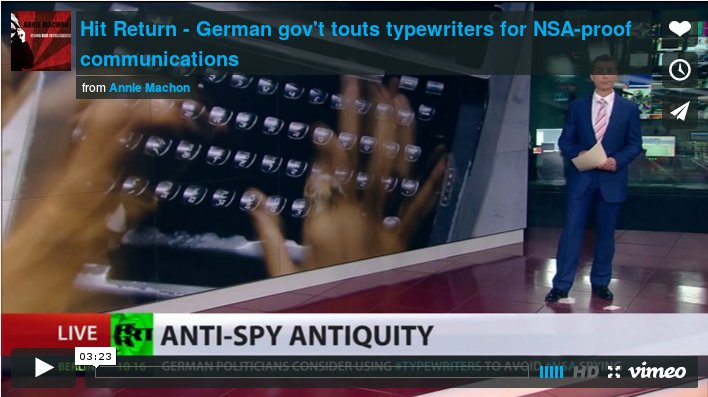
And here is the full text of the interview I gave on RT Op Edge:
Both typewriter and strong encryption is going to slow down communication, but upholding a basic democratic right of privacy seems to be more important, former MI5 agent Annie Machon told RT.
Amid the American-German espionage scandal, German politicians are considering going back to old-fashioned manual typewriters for confidential documents in order to protect national secrets from American NSA surveillance.
RT: Why would Germany think of using typewriters as a security measure?
Annie Machon: What I find interesting is that we have a situation where even our democratically elected representatives have to think deeply and seriously about how to protect the privacy of their communications, particularly when the investigation of the very subject of invasion of the privacy of the citizens, which is what the Bundestag at the moment is doing in Germany, trying to hold hearings to work out what exactly the NSA has been doing, which might be contravening the constitution of Germany. It is very difficult now but it is still possible to protect your electronic communications, but I think this announcement, this sort of statement by the Bundestag representative about going back to typewriters is interesting. It just makes a very strong point that we all need to be aware of the fact that we can be spied on at any time.
RT: Do you think everyone would follow Germany’s example?
AM: I think more and more people are concerned about their privacy because of the Edward Snowden disclosures. He has done the world a huge service with great personal cost, exposing the predations of the US Intelligence agencies and the NSA particularly, as well as a number of European agencies. In the past all countries spied on each other because they wanted to gain advantage over other countries, not necessarily their enemies, just an advantage economically or politically. However, what we are seeing at the moment is the result of what was the perfect storm for the USA in the 1990s, it was a perfect opportunity for them, because at that point the Cold War had ended, they were the sole remaining superpower on the planet, and precisely at that moment we had the evolution of the internet, a huge tech explosion of communications. They saw the opportunity and they went for it. Of course they did because that meant that they could embed whatever they wanted into the infrastructure that the whole world now uses for communication. Of course they were not going to turn this opportunity down, and they haven’t. That is what Edward Snowden disclosed.
So we have the situation now when everything can conceivably be hoovered up by the NSA and its vassal states in Europe, everything can conceivably be stored for ever and be used against citizens in the future if the laws change. And everything can conceivably be known amongst the private deliberations of our parliament’s democratically elected representatives. It’s worse than Orwellian.
It would be naïve to think that the US would not take up this opportunity, but of course they did, and these are the results we are living in. It would be lovely to think that we could go back to the era of having privacy in our lives that our governments would have power to ensure we had it, but in this globalized world it is very difficult to ensure that. One of the things that is little known out of all Snowden’s disclosures is the fact that it is not just what we send over the internet, it is also hardware, the computers, the technology we actually use that can already be compromised by the NSA. This is one of the things that came out just after Christmas last year. So we are living in a very complex world but there are very simple steps we can take, both the governments and the citizens, to protect our democratic and our basic right to privacy.
RT:Wouldn’t using typewriters slow things down in terms of communication? Why not use other, more modern ways of protecting communication?
AM: Either going back to using pen paper or typewriter or using very strong encryption is going to slow down one’s communication, there is no doubt about it. The point is though, what is more important, is it access to the latest celebrity gossip on the internet or is it actually upholding a basic democratic right of privacy. Because if we don’t have privacy, then we lose our freedom to communicate easily and in private, we lose our freedom to ingest information via video, audio or from reading, we cannot plan, we cannot conduct private personal relationships over the internet. So what is the price of a little bit of inconvenience when it comes to protecting our basic rights? I think that however light-heartedly the German politician mentioned using typewriters, when it comes to proper security issues within government, he is probably absolutely right. Last year there was a report as well, saying that some of the Russian security operators were now using typewriters too. We will all have to think about that, and it’s just a jolting wake up call to make us all think about that by stating that the German government is now going back to typewriters for certain things.
RT: What kind of solution do you see? Should people rely on their governments for protection of their privacy?
AM: There is a danger that people and the government will become very paranoid about trying to protect against the predations of the NSA and its vassals in Europe. However, I’m not sure as we as citizens can rely on governments to protect our privacy because all governments would want to know what is going on on the internet for legitimate reasons as well, to try to track down the illegitimate criminals and terrorists. But it can be easy for them to hoover up all the personal information and we, as citizens, need that have that guarantee of privacy. So one of the things we can do as citizens is to take responsibility in our own hands. We can indeed source all technologies, source computers pre-2008 that have not built-in hardware backdoors. We can use decent PGP encryption, we can use Tor to hide what we are looking at in the internet, we can use other encryption methodologies to protect our privacy, and we need to. I think it’s a very interesting crossroads in our history, both as civilizations, as democracy and as individuals, but also how we view the technology, how we use it, how we can better use it to protect our life, so that is going it be an ongoing debate. I’m very pleased to see this in Germany particularly. The politicians seem to be waking up around these issues and wanting debate these issues because the USA has got away with it for long enough across the West.
With thanks to Free Press Unlimited, the Dutch Advice Centre for Whisteblowers, Network Democracy, and the Whistleblowing International Network.
All these organisations came together to hold an international conference in support of whistleblowers on 18th June in Amsterdam.
It was a creative event, mixing up lawyers, journalists, technologists and whistleblower support networks from around the world at an event with speeches and workshops, in order for everyone to learn, share experiences, and develop new methodologies and best practice to help current and future whistleblowers.
A stimulating and productive day, at which I did the opening keynote:
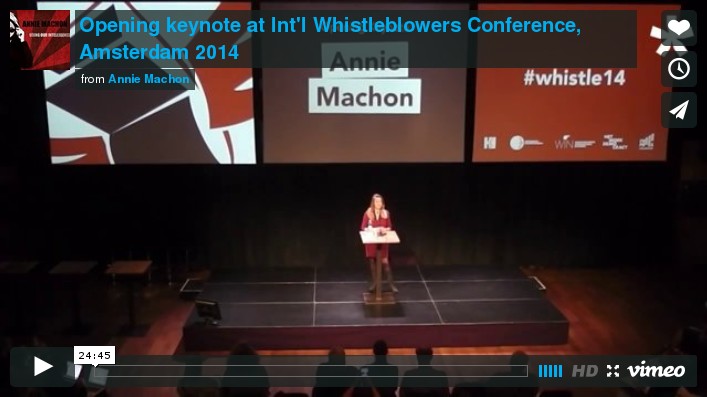
Here is an interview I did on 5th June, the anniversary of the start of Edward Snowden’s disclosures about the global surveillance infrastructure that is being built.
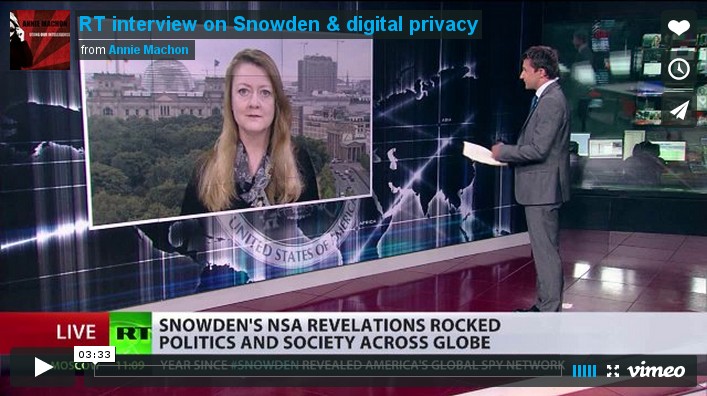
RT interview on Snowden & digital privacy from Annie Machon on Vimeo.
First published on RT OP-Edge. Also on Consortium News, Huffington Post, and the Sam Adams Award website.
A year ago I stumbled across a story about a worrying new surveillance programme developed by the NSA: Prism. While nobody was identified as the source of the disclosure, I was awestruck by the bravery of this unknown person.
At that time the Obama administration had been waging an aggressive war on whistleblowers: ex-CIA officer, John Kiriakou, who exposed the CIA’s torture programme, was languishing in prison while the torturers went free; Kirk Wiebe, William Binney and Thomas Drake of the NSA had narrowly escaped prosecution for exposing NSA malfeasance — indeed, despite having gone through all the approved channels, Drake had faced a 35-year prison sentence; and of course the kangaroo court had just started to try Chelsea Manning for her exposure of US war crimes. Inevitably, it is the whistleblower Manning who is now serving a 35 year stretch in prison, not the war criminals.
President Obama has used and abused the 1917 US Espionage Act against whistleblowers during his years in the White House more times than all his predecessors put together, while at the same time allowing a bone fide spy ring — the Russian illegals exposed in 2010 — to return home. This paranoid hunt for the “insider threat” has been going on since at least 2008, as we know from documents leaked to Wikileaks in 2010.
Against this background, fully aware of the hideous risks he was taking and the prospect of the rest of his life behind bars, a young man stepped forward. Four days after the initial Prism disclosure, Edward Snowden announced to the world that he was the source of the story and many more to come. He was clear then about his motivation and he remains clear now in the few interviews he has done since: what he had seen on the inside of the NSA caused him huge concern. The American intelligence infrastructure, along with its equivalent agencies across the world, was constructing a global surveillance network that not only threatened the constitution of the United States, but also eroded the privacy of all the world’s citizens.
The global surveillance state wanted to “master the internet”, as another disclosure proved, and the UK’s GCHQ stepped up to the plate. As increasing numbers of us conduct aspects of our lives over the internet (be it banking, health, social lives, organisations, activism, relationships) this growing lack of privacy strikes at the very root of democracy. Privacy was enshrined as a basic human right in the UN Declaration in 1948 precisely because without it we are vulnerable to the encroachments and abuses of the state. What Snowden has disclosed would the the Stasi’s wet dream and goes far beyond the dystopic horrors of George Orwell’s novel “1984”.
So what did Snowden disclose? Prism was only the start, and that was bad enough — a programme to scoop up all our metadata: whom we’re in contact with, for how long, what we’re reading, what we’re viewing. NSA apologists say that this is not invasive, it is not looking at the contents of communications. I can assure your that metadata is intelligence gold dust. It can provide a far more detailed overview of a person’s life than any individual communication often can.
But it gets worse. Then came Tempora and associated documents that disclosed that the UK’s GCHQ was mainlining information from the transatlantic fibre optic cables, which affected all European citizens, as well as displaying how GCHQ was prostituting itself to the NSA for money and putting NSA objectives above the priorities of the UK government.
And then XKeyscore, enthusiastically used by Germany’s BND, presumably without the knowledge of its political masters. There have been many more: Brazil’s Petrobras oil company, the French telephone network, charities, the Muscular access point and the massive Fascia database, which contains trillions of device-location records.…. Where to stop?
This year Britain’s Joint Threat Research Intelligence Group was using Squeaky Dolphin’s real-time monitoring of social media networks, and the bulk collection of private webcam images via the Optic Nerve programme.
This last most grimly does away with the “done nothing wrong, nothing to hide” argument. In this era of families living in different countries and long distance relationships, video skype is increasingly used to stay in contact with loved ones. And this contact can be somewhat intimate at times between couples. On video. Anyone who has ever used skype for such purposes must surely be feeling violated?
Out of this morass of spying came moments of personal annoyance for western politicians, not least the information that German Chancellor Angela Merkel’s mobile phone was also being tapped, as were those of numerous other politicians. Which rather blows out of the water the much-abused argument that all this surveillance is to stop terrorists. On what planet would the NSA spooks need to live to seriously think that Merkel could be deemed a terrorist?
All these disclosures are of the gravest public interest. Yet how have western politicians reacted? In the usual way — shoot the messenger. All the standard li(n)es have been trotted out by the spies: Snowden was too junior to know what he is talking about, and was “just” a contracted systems administrator (this line says more the ignorance of the politicians about all things tech than anything about Snowden’s job); that Snowden is a traitor for fleeing to Russia, when in fact he was trapped there by the USA withdrawing his passport while in transit to Latin America; or that he should “man up” and return to the US to stand trial. There were even apparently calls from the spies for him to be extrajudicially murdered.
Despite this, his disclosures have resulted in congressional hearings in the US, where senior spooks have been caught out lying about the efficacy of these spy programmes. A US federal judge has declared the NSA’s activities unconstitutional, and minor reforms are underway to protect the rights of US citizens within their own country.
Which is a start. However, that still leaves the rest of us living under the baleful gaze of the NSA and its vassals.
The British response has been largely muted, with politicians immediately assuring the grateful citizens of the UK that everything done by the spies is legal and proportionate, when in fact it was manifestly not. Nor is this any consolation for the rest of Europe’s citizens — after all, why should the British Foreign Secretary be able to take it upon himself to authorise intercept programmes such as Tempora that sweep up the communications of an entire continent?
Press discussion of Snowden’s disclosures in the UK has been largely muted because of a censorship notice slapped on the media, while the Guardian newspaper that helped to break the story had its hard disks smashed up by GCHQ.
Other countries have displayed a more robust response, with Brazil planning to build its own transatlantic cables to Europe to avoid the Tempora programme, and in Germany people have been demanding that the constitution be upheld and privacy ensured against the American surveillance behemoth.
The European parliamentary Civil Liberties, Justice and Home Affairs (LIBE) committee has held months-long hearings with evidence from tech experts, whistleblowers and campaigners about what it should do to protect EU citizens from the predations of the US. Edward Snowden himself gave a statement. This is all well and good, but it would be more helpful if they could give Snowden asylum in Europe and also put in place some meaningful measures to protect our rights one year on — in fact, all they would need to do is enact the provisions of the European parliament’s own July 2001 report into the Echelon fiasco.
Echelon, some of you may remember, was a global proto-surveillance network, where the intelligence agencies of the US, UK, New Zealand, Australia, and Canada (now called Five Eyes) could all share product and subvert oversight measures in each others’ countries. In 2001 the EU recommended that Europe develop its own internet infrastructure and move away from its dependency on US corporate proprietary software. All good suggestions, but all too soon forgotten after 9/11 and the rush to the “war on terror”.
One year on from Snowden I would suggest that these measures should indeed be implemented. The European Parliament needs to take action now and show its 500 million citizens that it is serious about protecting their rights rather than pandering to the demands of the US government and its corporate sponsors.
So, on this anniversary, I want to salute the bravery of Edward Snowden. His conscious courage has given us all a fighting chance against a corporate-industrial-intelligence complex that is running amok across the world. I hope that we can all find within us an answering courage to do what is right and indeed take back our rights. His bravery and sacrifice must not be in vain.
Here is my recent RT interview about the recent dispute between Wikileaks and Glenn Greenwald on what exactly the parameters should be in media reporting of whistleblower disclosures:
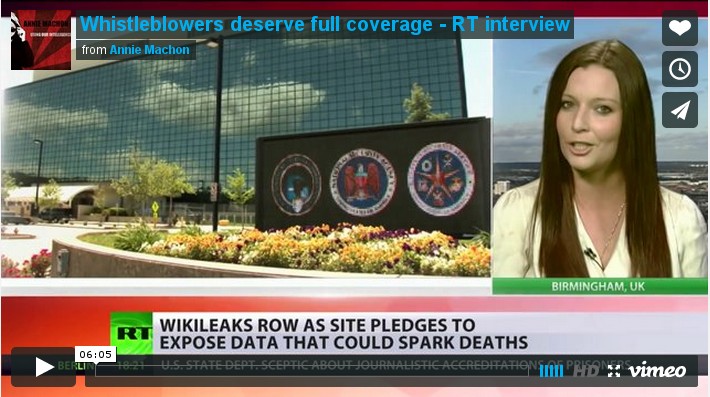
Whistleblowers deserve full coverage — RT interview from Annie Machon on Vimeo.
Of course, thanks to Wikileaks this evening, we now know the country that Glenn Greenwald redacted from his original report was Afghanistan.
Why on earth should the Afghanis not be allowed to know the sheer scale of surveillance they live under? In fact, would many be surprised? This is an excellent related article, do read.
Here is a panel discussion I did at the International Journalism Festival in Perugia, Italy, in May 2014:
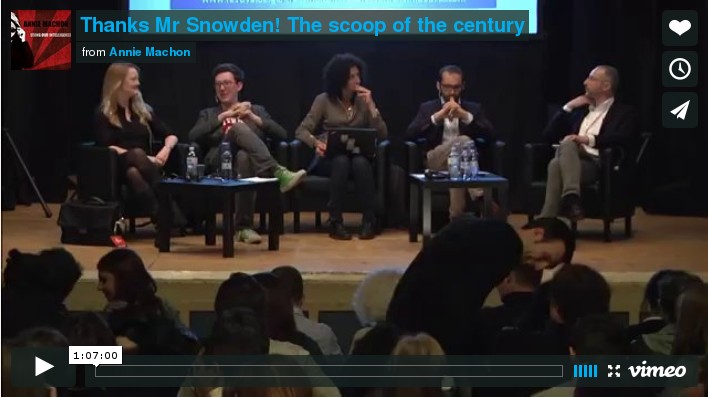
Here is an interview I did for German national TV, ZDF, while speaking at the European Media Art Festival in Osnabrueck in April:
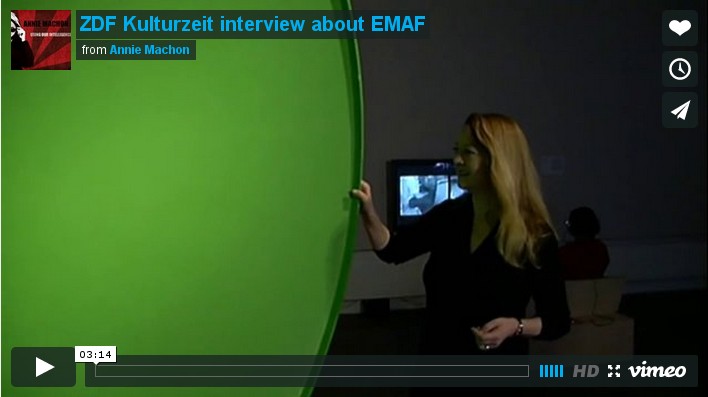
ZDF Kulturzeit interview about EMAF from Annie Machon on Vimeo.
